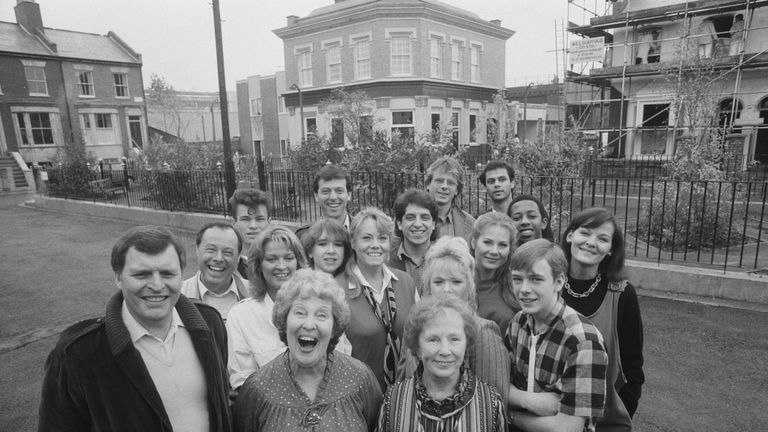Ex-EastEnders actress died alone from an accidental overdose, inquest hears
An ex-EastEnders actress died after taking an excessive amount of morphine while suffering from two terminal lung conditions, an inquest has heard.
Sandy Ratcliff, one of the BBC soap’s original cast members, played cafe owner Sue Osman between 1985 and 1989.
Off-screen, she struggled with heroin addiction for around 20 years and died alone in the bedroom of her sheltered accommodation in Stoke Newington, London – aged 70 – on 7 April.
The inquest heard she had been discharged from hospital the day before and given morphine for pain relief.
Her cause of death was given as bronchopneumonia and morphine toxicity as a result of a malignant lung tumour and chronic obstructive pulmonary disease (COPD).
Ratcliff suffered three strokes in the years leading up to her death, according to her son William Palmer – the first being in 2013 after the death of her partner.
Giving evidence, Mr Palmer said the stroke had left his mother with pain in her left arm, for which she was given codeine by her GP – but the inquest heard she would take more than the prescribed amount, for both pain and “recreational use”.
At one point, she was taking 100 tablets per week, before the dose was reduced to eight.
Her doctor, Helen Freeman, said: “The difficulty with chronic pain is that it is difficult to manage with opioids and she was taking these at higher levels.”
She revealed that Ratcliff knew she had a malignant tumour after being diagnosed in 2014.
Four years later, her condition got worse and by early 2019 she had started to cough up blood.
Dr Freeman told the inquest that Ratcliff was seen many times by GPs at the start of the year, and in March she had warned her “she could be dying and was fatally unwell” – but she refused to go to hospital.
She was eventually convinced to be admitted by her carer – and was then treated for a lung infection.
The GP said Ratcliff was discharged on 6 April and her codeine was switched to morphine.
The next day, paramedics were called when she was found unresponsive in her bedroom, and she was pronounced dead at the scene.
The level of morphine found in her blood was within the therapeutic range, according to pathologist Alan Bates.
He added: “There is a danger as morphine is a respiratory depressant there is a greater danger of overdose when there is significant natural lung disease.”
Giving her conclusion, coroner Mary Hassell said Ratcliff was “near to the end” when she was taken to hospital.
She said: “I don’t think the morphine was used to end her life. She was using it as she had used drugs for many years.
“She died from a combination of two naturally occurring terminal conditions and an excess of morphine.”
Source: Read Full Article



